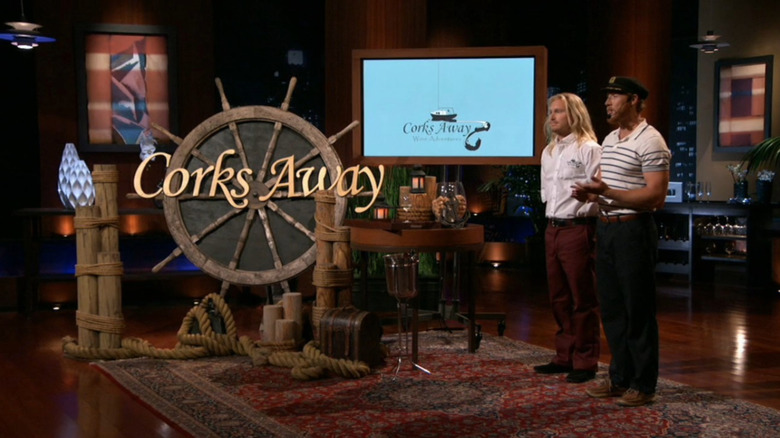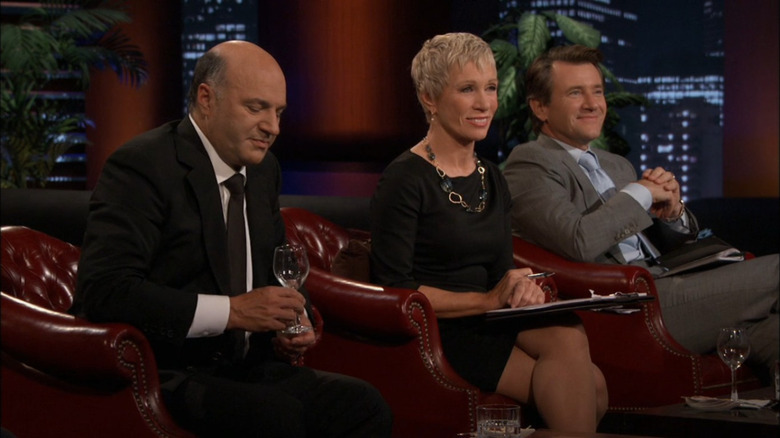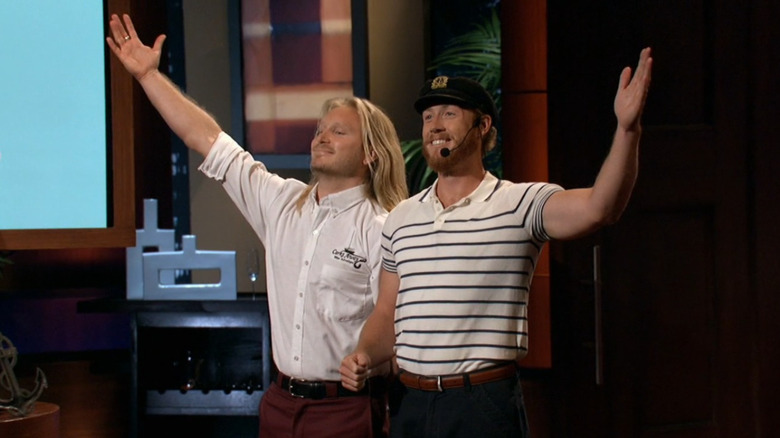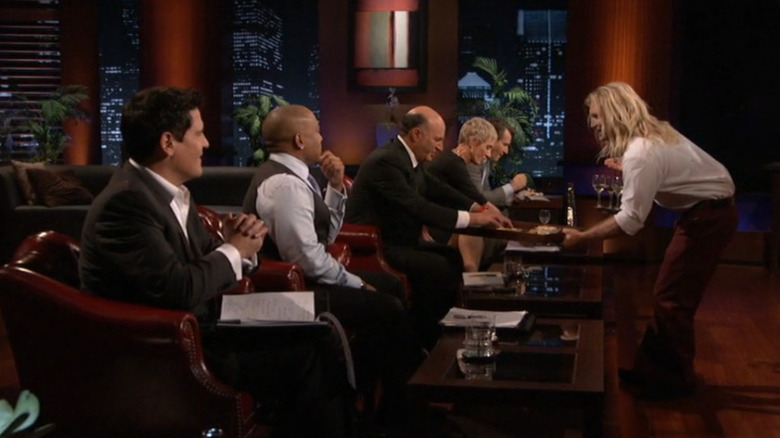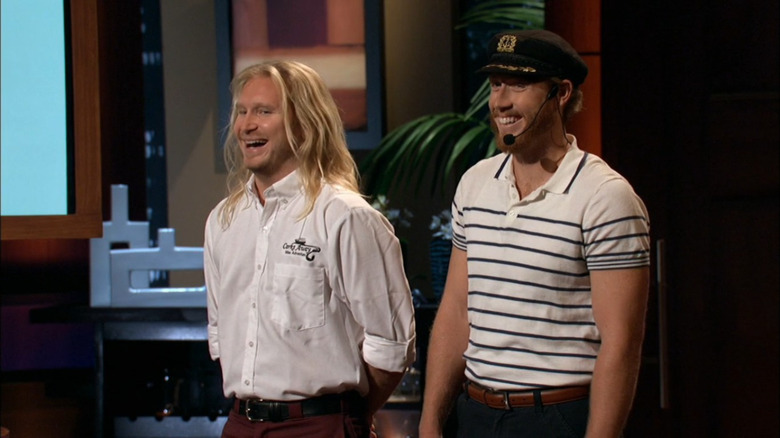What Really Came Of Corks Away Wine Cruise From Shark Tank?
ABC's entrepreneurial reality TV show "Shark Tank" has featured some incredible travel-related inventions, and some unique ideas that didn't quite have what it takes to turn a profit. For example, you may remember Oru Kayak, the fold-up boat from "Shark Tank" that secured a promising deal but ultimately couldn't go the distance. So when the founders of Corks Away Wine Cruise arrived on-screen in Season 4, Episode 10 to pitch their unique take, our interest was piqued. Captain Nathan Buffet and Shane Cianciolo began their business with one boat, a refurbished 1961 wooden mast sailboat named Wildflower, where they offered guests a high-end wine tasting experience while sailing along the California coast. Usually, you should think twice about trying to sneak wine onto a cruise, but with Corks Away you wouldn't have to.
They took up to six guests per cruise and averaged about 12 cruises a week. Each journey, complete with unique wines and appetizers, lasted an hour and a half. Cianciolo and Buffet told the Sharks they made over $250,000 in sales in their first year. Their business was doing well, so naturally the duo wanted to expand, seeking funding from the Sharks primarily to turn Corks Away into a franchise.
What happened to Corks Away on Shark Tank?
Nathan Buffet and Shane Cianciolo arrived on set asking the Sharks for $105,000 in exchange for 20% equity in their business. To achieve their vision of franchising Corks Away, the pair planned on getting licensed captains to buy in with $175,000. That figure would give franchisees a boat and a business plan. They also told the Sharks that they wanted to get their signature appetizer, the pesto torte, into grocery stores. Lastly, they said they had a long-term dream of having an indoor dining cruise in Las Vegas.
Unfortunately, the Sharks weren't taken with any of the ideas. When the Sharks asked how much a captain could buy a boat for, Buffet and Cianciolo admitted that this would only cost about $35,000. When compared to the $175,000 Corks Away wanted to charge for each franchise, the plan didn't seem convincing. The Sharks also felt like the grocery store angle veered too far from their main concept, and the Las Vegas plan was too far-fetched to be plausible.
Despite the founders' enthusiasm, they couldn't get one of the Sharks to bite. Mark Cuban felt like the business model was limited in terms of how much money they could make, since they wouldn't be able to have many boats in one location. Robert Herjavec saw too many potential flaws in the plan, and Daymond John pulled out because he didn't like the business model or their long-term plans, particularly their Las Vegas idea. Kevin O'Leary — a wine enthusiast with his own label in California — seemed to be the most enthusiastic of all the Sharks, but ultimately couldn't get behind the idea, either. Lastly, Barbara Corcoran expressed concern and ultimately could not invest. With that, all of the judges pulled out.
How did Corks Away do after Shark Tank?
The "Shark Tank" entrepreneurs had bitten off more than they could chew, but the outcome of their appearance on the show didn't stop them from chasing their dreams. Despite getting no traction with the savvy investors, Buffet and Cianciolo made the best of the international exposure and enjoyed a spike in bookings and interest at their location in Long Beach.
They increased their offerings with wine blending classes, a wine club membership, and private yacht charters that showcased the best of California's wine scene and natural coastal beauty. They even got a second boat that could seat more guests. The episode aired in 2012 and they had a surge of reviews on Yelp immediately following its release and into 2013 — some bad, but mostly positive. Like what became of Getaway, another promising company that pitched on "Shark Tank," business beyond the show was challenging for the founders.
Is Corks Away still in business?
Despite the significant surge in popularity following the their appearance, the small cruise company ended up closing down. It's not totally clear what happened to Corks Away, but it seems like the business fizzled out around 2014. There's no definitive explanation, but some of the online reviews might lead to clues as to why the business died out. In terms of personality and hosting skills onboard, Nathan Buffet and Shane Cianciolo got rave reviews from guests. However, when it came to technical and organizational matters, Corks Away did poorly. Customers wrote that there were no customer service representatives, and that they couldn't get in touch with the company when they had issues. Their poor response rate seemed to be the biggest problem in terms of feedback.
Cianciolo replied to customers on Yelp in 2013, to notify upset guests that Corks Away had just hired a part-time customer service representative. "Captain Nathan and I ... are not computer savvy and apologize for the delay in upgrading our customer service portion of the business!" Cianciolo wrote. In replying to another review, he said, "We apologize it took us so long to get the customer service portion of our business under control, we were very busy working to make the cruise experience exceptional!"
Other guests complained that the appetizer part of the cruise wasn't special enough. Presumably, people who'd watched the "Shark Tank" episode would look forward to the pesto torte the founders had hoped to get on grocery store shelves. So when some customers were served hummus and nuts, they left a review expressing disappointment, saying they were expecting something more creative.
What's next for the Corks Away founders?
After Corks Away folded closed the business, Nathan Buffet and Shane Cianciolo took their boats to El Salvador. They took to the Corks Away Wine Cruises Facebook page to share an update in March 2014: "Your Corks Away Crew is now in El Salvador helping build Eco Tourism for Santos Marina. We look forward to sending you comfortable/affordable/exciting Central American tours for your upcoming 2015 vacation." However, the Marina's website is no longer active and its Facebook page has no recent mentions of Corks Away or its founders.
Cianciolo's claim that he and his business partner are not computer savvy seems to hold true. Neither Buffet nor Cianciolo have strong social media presence and prefer to keep under the radar by staying offline. For example, Cianciolo has a bare-bones LinkedIn page without any posts, and they don't seem to have public accounts on Instagram. Based on the infectious enthusiasm and big dreams we saw the duo share on "Shark Tank," we can only assume they're cooking up their next big idea. "Shark Tank" is available for purchase on Prime Video.
